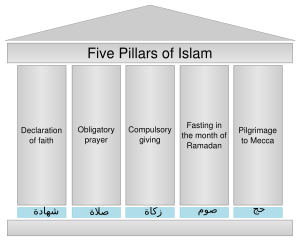Five Pillars of Islam facts for kids
The Five Pillars of Islam are five main rules that all Muslims follow. Muslims all over the world practice these important rules. They help Muslims live a life similar to the one led by the Prophet Muhammad. The Five Pillars are: believing in one God, praying, giving to charity, fasting during Ramadan, and making a pilgrimage to Mecca if they are able.
Contents
First Pillar: Shahada (Declaration of Faith)
The first pillar of Islam is the Shahada. This is a declaration, or statement, of faith. It has two parts: "There is no god but God" and "Muhammad is the messenger of God." Saying this statement is how someone becomes a Muslim.
The first part, "There is no god but God," means Muslims believe in only one God. This shows the main idea of their faith. The Shahada is often the first thing said to a newborn baby. It is also the last thing said to a person who is dying. This shows how important this declaration is throughout a Muslim's life.
Second Pillar: Salah (Prayer)
The Second Pillar of Sunni Islam is Salah, which means prayer. Muslims pray five times a day at specific times. These times are at dawn, noon, afternoon, evening, and night. The prayers have special names: Fajr (dawn), Dhuhr (noon), ʿAṣr (afternoon), Maghrib (evening), and ʿIshāʾ (night).
Before praying, Muslims perform wudu, which is a special washing. They wash their hands, face, and feet to become clean. During prayer, Muslims face towards Mecca. The prayers involve specific body positions. These include bowing, standing, and prostrating (kneeling with the forehead on the ground).
A Muslim can pray almost anywhere, like in an office or a field. However, praying in a mosque is preferred. This is because it allows Muslims to pray together as a community. If someone is sick, they can still pray, even while lying down. When traveling, Muslims can sometimes combine certain prayers to make it easier.
Third Pillar: Zakat (Charity)
The Third Pillar of Islam is Zakat. This means giving to charity or alms. The word "Zakat" also means "purification." It suggests that giving a part of one's wealth makes the rest of it pure.
Muslims who are able must give a certain amount of their wealth to help the Islamic community. This is usually about 2.5% of their savings. This money is used to care for holy places and mosques. It also helps people who are poor or in need. Giving Zakat helps a person find balance and encourages growth in their life.
Fourth Pillar: Sawm (Fasting)
The Fourth Pillar of Islam is Sawm, or fasting. Fasting happens during the holy month of Ramadan. This month is part of the Islamic calendar, which is based on the moon. Because of this, Ramadan starts about 11 days earlier each year.
During Ramadan, Muslims do not eat, drink, or smoke from dawn until sunset. After sunset and before dawn, they can eat and drink normally. The main reason for fasting is to remind Muslims that everyone needs God's help. It also helps them remember people who are less fortunate and need support. Ramadan is a time for Muslims to think deeply, strengthen their faith, and give more to charity.
Some groups of people do not have to fast. These include young children, people with health conditions like diabetes, elderly people, and pregnant or breastfeeding women. People who are sick or traveling are also excused from fasting.
Fifth Pillar: Hajj (Pilgrimage)
The final Pillar of Islam is the Hajj. This is a special pilgrimage, or journey, to Mecca. Every Muslim who is able is required to make this journey once in their lifetime. The Hajj takes place during the 12th month of the Islamic lunar calendar.
During the Hajj, all Muslim men wear two simple white sheets. This shows that everyone is equal, no matter their wealth or background. Women wear a simpler version of their everyday clothes. Pilgrims put on these white sheets when they enter the holy area of Mecca. This marks a state of "ihram" or purity.
After completing the Hajj, a Muslim is known as a hajj (for men) or hajja (for women). Key rituals of the Hajj include:
- Walking seven times around the Kaaba, called Tawaf.
- Touching the Black Stone, called Istilam.
- Walking seven times between Mount Safa and Mount Marwah, called Sa'yee.
- Symbolically stoning the Devil in Mina, called Ramee.
Islamic teachers say that the Hajj should be a sign of devotion to God. It should not be done to gain social status. A Muslim should think about their reasons for making the pilgrimage. This journey should inspire them to always try to improve themselves. A pilgrimage made at any other time of the year is called an Umrah. While not required, it is highly recommended.
See also
 In Spanish: Pilares del islam para niños
In Spanish: Pilares del islam para niños
 | Roy Wilkins |
 | John Lewis |
 | Linda Carol Brown |



